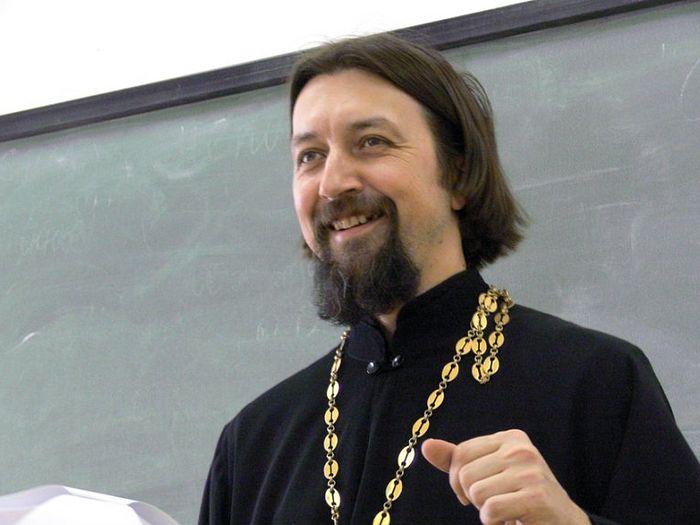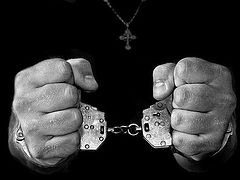Is drunkenness a mortal sin? After all, the apostle Paul said, Be not deceived: neither fornicators, nor idolaters, nor adulterers, nor effeminate, nor abusers of themselves with mankind, Nor thieves, nor covetous, nor drunkards, nor revilers, nor extortioners, shall inherit the kingdom of God (1 Cor. 6:9-10). Why then do we so often have an indulgent attitude towards drunkenness, even among believers?
The genuine communion of the Kingdom of God begins with sobriety
Fr. Valery Dukhanin
Drunkenness is a mortal sin, and I would even say, a deadly, death-bearing, murderous sin. Recall the story of the ascetic who was long tempted by a demon who then offered, “I will leave you alone; just commit at least one of these three sins: murder, fornication, or drunkenness.” The ascetic answered, “To kill a man is fearful, for it is a great evil; to commit fornication is a shame, for I would thus lose my chastity; to get drunk, it seems to me, is a small sin, for man quickly sobers up by sleep. I will go get drunk so the demon doesn’t tempt me anymore.” As soon as he went into the city and got drunk, he immediately got tangled up with a shameless woman and fell into sin with her. Then the woman’s husband arrived, and the fornicator killed him. Thus, drunkenness plunges into all the remaining sins.
In some sense, drunkenness is an expression of human sin in general, because any sin, any sinful passion intoxicates the soul, deprives it of its sobriety, and it loses control over itself, beginning to do what is unthinkable for a man of sound mind. Man, drunk with passion, goes to murder, thievery, fornication, and destroys everything around and kills his own soul. Therefore, intoxication by alcohol is in some sense a visual image and symbol of the sinfulness of all mankind.
People have become accustomed to seeing drunk people around them, and their asocial lifestyle. People know that alcohol causes severe dependence, that it leads to loss of health, loss of employment, and the destruction of the family. But people are used to drunkenness, as to something natural to our world, to unswept streets, to car accidents, and to domestic scandals and squabbles. Drunkenness has become perceived as a commonplace, trivial sin.
But if we saw how someone hung himself every day, or cut his veins, would we really not be horrified by this; would it really not evoke in us a deep inner disturbance about how these people are destroying themselves? Drunkenness is a slow suicide, it is depriving yourself of life—both the temporal bodily life, and the eternal Heavenly life. Only a mother’s heart aches with immeasurable pain for a drunkard son; only a wife will find no place for herself from her husband’s propensity for wine; only children grieve and worry when they see their drunk parents.
An indulgent attitude towards drunkenness began with the fact that we no longer have holidays without alcohol. Without wine, joy is not joy, and a meeting with a friend is not perceived as a celebration if the friends don’t drink together. Alcohol gives the illusion of joy, and, it seems, reduces stress, and helps to relax. If we would show at least a little scientific curiosity, then we would see that drunkenness is the result of ethanol poisoning. Alcohol kills the brain, but for us, unfortunately, it’s more important that it gives a feeling of bliss.
Established tradition is hard to change. It’s practically impossible to fight with customs that have been accepted by the people. But every Christian can at least ask himself, “Is this necessary for me personally? Why should I poison myself, destroy my health, and deprive my soul of purity and sobriety?” And if, according to the apostle Paul, drunkards do not inherit the Kingdom of Heaven, then the true path to God and genuine communion with the Kingdom of God begins precisely with sobriety.
Drunkenness deprives a man of what is most important—the image of God
Fr. Lev Arshakyan
Drunkenness is the scourge of our time, one of the most powerful lures of the forces of evil which entraps the human soul. It has the most severe consequences because it deprives man of what is most important—the image of God. He literally becomes hideous,1 and not just in the external sense; although we see to what extent people caught by this passion can sink. But most importantly, he loses one of the most important of God’s gifts—the intellect, the ability to reason. The mind is darkened and man falls under the power of demonic powers. Quite often, coming to themselves after an alcoholic intoxication or poisoning, people wonder in horror, “How could I have done that?!” I know many families that carry the heaviest crosses due to the alcoholism of their loved ones. The children and parents suffer, and those who are ensnared by this devilish bait—alcoholism. Thus, yes, drunkenness is a mortal sin, related to the mortal sin of gluttony. Food is necessary for the body, but we know that the desire for satiety can lead to mortal sin, when the meaning of life becomes the belly and its satisfaction. People live to eat, overeating, and not observing the fasts.
However, on the other hand, we know that wine maketh glad the heart of man (Ps. 103:15). Wine is the healing juice of the grape vine which is then transformed into the flesh of Christ. The same apostle Paul who said that drunkards will not inherit the Kingdom of God urged Timothy to drink not only water, but also a little wine to strengthen his health from infirmities: Drink no longer water, but use a little wine for thy stomach's sake and thine often infirmities (1 Tim. 5:23). And on Mt. Athos they even bless ouzo—a strong anise liqueur. Therefore, we must emphasize that wine is not evil in and of itself. Therefore, we’re not against wine—we fear addiction and a passion for wine. If a man steps over a certain edge, then he falls into the demonic world, and demons possess him. The Church, prayer, and ecclesial repentance, together with medicine and loved ones should be able to help such people.
Why then do we have such indulgence for drunkenness, you may ask. Largely because, I think, an invalid cannot condemn an invalid. Drunkenness, as odd as it may seem, is not the worst sin. I think being proud is far worse. A proud person may look outwardly attractive and good, but his soul is in greater perdition than the soul of the repentant alcoholic.
Therefore, we have to be able to help such people. There are very many so-called domestic alcoholics, who are used to drinking once a week, but it’s addictive, and, unfortunately, there are many wonderful, talented people, who become completely dependent on this potion, and they simply die—spiritually and physically. Therefore, we must use every power—ecclesial, familial, and public—to not pass these people by, and not consider them outcasts. We need to understand that these people are in trouble and be able to help them. Here prayer, repentance, love, and the patience of loved ones are very necessary.
But the people who are caught up in this passion just need to renounce this potion, as a diabetic renounces sugar, or other sick people give up whatever is causing them such terrible harm. Likewise, in this case they must deliberately abandon this poison and consciously engage in the battle for their immortal souls.
We must overcome the wicked tolerant attitude towards excessive drinking
Archpriest Maxim Kozlov
According to St. John Climacus, there is one sin unto death: when a man sins and abides in unrepentance. With this, repentance should be understood not in the sense of verbal recognition of your sins in Confession, but in the sense of an inner change in regard to sinful passions. Theoretically recognizing yourself as a bad person still does not mean repentance for your sins. Repentance is when you look upon your sin with hatred and rejection. Nevertheless, according to the aforementioned reason, when we speak about mortal sins in regard to the designation of this or that sin, we speak about it, of course, in a conditional sense, because there is no sin for which man would not be able to repent and rise up.
However, it’s impossible not to note that the attitude of various Christian peoples towards various harmful passions have taken shape differently. For example, a drunk priest in Greece is absolute nonsense, and if they see a priest drunk there, he will be suspended or deprived of his rank. Conversely, a smoking priest in Greece is common enough—nothing terrible. But with us Russians it’s the opposite: The people would be indignant if they see a priest with a cigarette or even a pipe, but if one of our priests drinks a little, they would treat him with understanding.
We can make different arguments and put forward various reasons for why it has turned out this way. However, we must overcome the wicked tolerant attitude towards excessive drinking, because it is obvious that this passion torments a huge number of our fellow citizens, including even Church people. A permissive attitude towards it, as to any passion, hinders its eradication. Internal agreement that it is something, of course, not good, but by and large tolerable, leads to drunkenness taking root, alas, among many of us.








